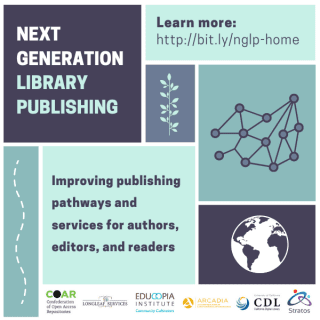
June 30, 2021
A Strengths-Based Approach to Evaluation and Transformational Change in Publishing
By Sarah LippincottWhen Katherine Skinner and I published the Values and Principles Framework and Checklist last year, we introduced them as mechanisms to hold actors in the scholarly communication system accountable to their stakeholders and demonstrate their commitment to openness in concrete and documentable ways. We conceived the framework and checklist as living, iterative, and adaptable documents. Our first major revision, to be released this fall, reflects a deliberate shift to a strengths-based model of evaluation and change.
Our field has written volumes on the deficits, gaps, failures, and problems in the current scholarly communications system. Collectively, we dedicate enormous energy to interrogating the root cause(s) of dysfunction, raging against the bad actors who perpetuate broken models, and fretting about broken processes. Our problem-centered discourse may lead to incremental improvements, but inhibit transformational change. We reinforce current issues and problems by focusing on the mechanics of solving them. This in turn distracts us from the work of envisioning and building successful futures.
We need tools that recognize growth and evolution (rather than results), identify strengths (rather than deficits), and center aspirations (rather than descriptions of the current state).
Crucially, we are working to ensure the checklist does not reinforce current power dynamics in scholarly communication by privileging established players. Ana Enriquez of Penn State University Libraries, among others, challenged us to think about how the framework and checklist can “prevent the burden of demonstrating this adhesion from falling inequitably upon smaller publishers.”
In reimagining the framework and checklist, we are drawing inspiration from appreciative inquiry (AI), an organizational change methodology that prompts organizations to “appreciate the best of ‘what is,'” to ask themselves “where does our organization excel and how does that manifest?”
While we believe there are objective measures that can classify an organization’s alignment with the values and principles, the checklist approach alone could reinforce a deficit, problem-focused mindset. Organizations and communities that can’t check all the boxes may be seen as lagging behind, failing, or out of step. Rather, we want the focus to be on how these pieces all add up to create transformational change, how building on our strengths helps us better embody our values.
What can the community expect from our next iterations of the framework and checklist?
- Language revisions that center strengths, growth, and progress. Our language choices matter. AI emphasizes the power of language in constructing our reality. Discourse on broken models and sick ecosystems, while apt and warranted, reinforce (even amplify) current patterns, generate feelings of anger and hopelessness, and restrict our thinking to solving present-day problems rather than working towards ideal futures. Revisions will ensure that the checklist questions encourage organizations to reflect on their ideal future, rather than their perceived deficits.
- Exercises that can help all players (from start-up through maturity) to improve and communicate their alignment. The revised framework will include resources that help organizations demonstrate their signature contributions to a more open, equitable, and productive scholarly communication ecosystem and that help them build towards their ideals. These exercises will be designed for self-administration or for deployment by a facilitator. We imagine a possible cohort model that encourages peer organizations to collaborate on these alignment exercises.
- Tracks or versions of the checklist appropriate for organizations at different stages of maturity. This work will build on Educopia’s community cultivation framework, which recognizes that hand-in-hand with the financial and human resources that organizations need to thrive, they also need tools that build maturity and capacity. The checklist will look different for communities in different stages of maturity (formation, validation, acceleration, and transition).
We remain committed to building a framework that appropriately balances accountability and flexibility. We believe that all stakeholders will benefit from tools that help them concretely evaluate current alignment and build towards ideals.